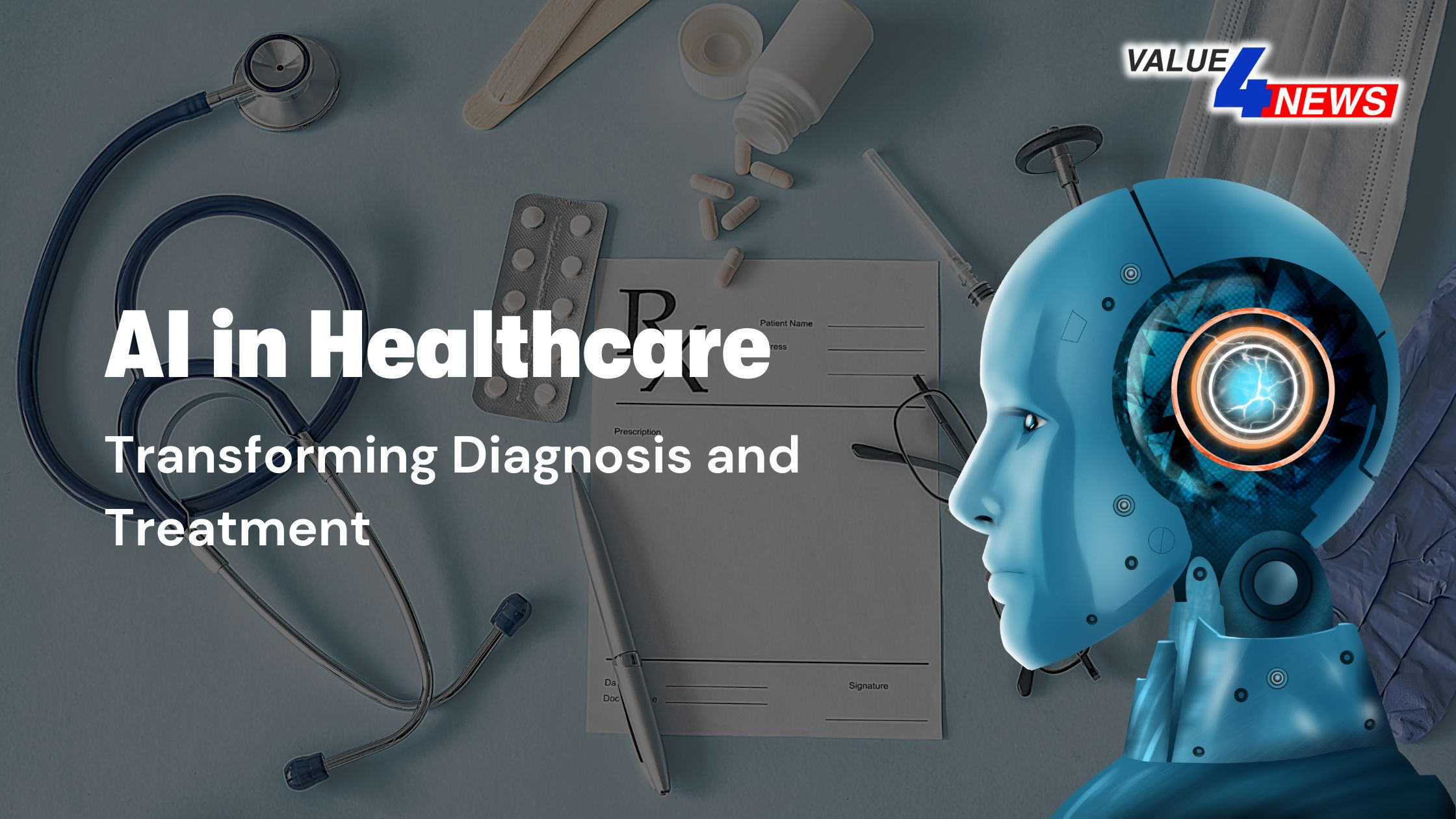The field of healthcare is witnessing a remarkable transformation driven by the integration of Artificial Intelligence (AI) technologies. AI’s rapid advancement has paved the way for groundbreaking applications in diagnosis and treatment, revolutionizing patient care and outcomes. In this blog, we will delve into the fascinating world of AI in healthcare, exploring its potential and impact on diagnosis and treatment.
Understanding AI in Healthcare:
What is AI in Healthcare?
AI in healthcare refers to the utilization of advanced algorithms and machine learning models to process vast amounts of medical data, extract meaningful insights, and support medical decision-making. The goal is to augment the capabilities of healthcare professionals, enhance diagnostic accuracy, and personalize treatment plans.
The Promise of AI in Healthcare:
The integration of AI in healthcare holds immense promise. By analyzing complex datasets and identifying patterns, AI systems can assist clinicians in diagnosing diseases at an early stage, predicting patient outcomes, and recommending personalized treatment regimens. This can lead to improved patient outcomes, reduced medical errors, and optimized resource allocation.
AI in Diagnosis:
Early Detection and Diagnosis:
One of the most significant contributions of AI in healthcare is its ability to facilitate early detection and diagnosis of various medical conditions. AI-powered algorithms can analyze medical images, such as X-rays, MRI scans, and CT scans, with remarkable precision, aiding in the early identification of diseases like cancer, cardiovascular conditions, and neurological disorders.
Improving Accuracy and Speed:
AI’s capabilities go beyond human capacity when it comes to analyzing large volumes of medical data swiftly and accurately. With AI’s assistance, healthcare professionals can reach more accurate diagnoses in a shorter time frame, leading to timely interventions and better patient outcomes.
Reducing Misdiagnosis:
Misdiagnosis can have severe consequences for patients, leading to unnecessary treatments and delays in appropriate care. AI technologies are reducing the occurrence of misdiagnosis by providing additional insights and helping clinicians consider a broader range of factors when making diagnoses.
AI in Treatment:
Drug Discovery and Development:
AI is accelerating the process of drug discovery and development.
Robotic Surgery and Assistive Technologies:
AI-powered robotic surgery systems are revolutionizing the field of surgery.
Challenges and Ethical Considerations:
Data Privacy and Security:
The integration of AI in healthcare relies heavily on vast amounts of patient data. Ensuring the privacy and security of this data is of utmost importance to maintain patient trust and comply with regulatory requirements. Healthcare organizations must implement robust data protection measures to safeguard sensitive medical information.
Bias and Fairness:
AI algorithms are only as good as the data they are trained on. Biases present in historical medical data can lead to biased AI predictions and recommendations. It is essential to address and mitigate such biases to ensure equitable and fair healthcare for all patients.
Interoperability and Integration:
To fully leverage the potential of AI in healthcare, seamless integration with existing medical systems and electronic health records is crucial. Achieving interoperability among various healthcare platforms will enable smooth data exchange and foster the widespread adoption of AI technologies.
AI and Patient Engagement:
Enhancing Patient Education:
AI technologies can play a vital role in empowering patients through education. Chatbots and virtual health assistants powered by AI can deliver individualised health information, respond to frequently asked medical questions, and provide advice on lifestyle and preventative actions. Patients can manage their own health more actively by encouraging health literacy.
Remote Patient Monitoring:
AI-enabled remote patient monitoring systems have gained traction, especially during the COVID-19 pandemic. These systems allow healthcare providers to track patients’ vital signs, symptoms, and overall health remotely. Continuous monitoring and early detection of abnormalities can lead to timely interventions, reducing hospital readmissions and improving patient outcomes.
Mental Health Support:
AI-driven mental health platforms are revolutionizing the way mental health services are delivered. From chatbots providing empathetic conversations to AI algorithms identifying early signs of mental health disorders, these tools are breaking down barriers to mental health care and destigmatizing seeking help for psychological well-being.
AI and Healthcare Workforce:
Augmented Intelligence, not Artificial Replacement:
There is often concern about AI replacing healthcare professionals. However, the true potential lies in augmenting human intelligence with AI. By automating repetitive tasks and providing data-driven insights, AI allows healthcare professionals to focus more on patient care, fostering a harmonious relationship between technology and human expertise.
Supporting Clinical Decision-making:
Clinical decision support systems with AI capabilities help medical professionals make judgements by examining patient data, scientific research, and recommended treatments. These platforms can assist doctors in keeping abreast of the most recent findings, resulting in evidence-based practises and improved patient outcomes.
Addressing Workforce Shortages:
Many regions face healthcare workforce shortages, especially in remote and underserved areas. AI-driven telemedicine and telehealth platforms can bridge the gap by enabling remote consultations and diagnostic services. This not only improves access to care but also optimizes healthcare resource distribution.
AI Adoption Challenges:
Data Quality and Interoperability:
Large volumes of high-quality data are needed for training and validating AI models. Because data may be kept in multiple formats and may not always be available, ensuring data quality and interoperability among diverse healthcare systems can be difficult.
Regulatory Compliance:
Healthcare is a highly regulated industry, and AI applications must comply with stringent data protection and privacy regulations. Maintaining compliance while harnessing the potential of AI in healthcare requires careful navigation of legal frameworks.
Overcoming Resistance to Change:
The integration of AI in healthcare represents a significant paradigm shift. Resistance to change among healthcare professionals and stakeholders can hinder the widespread adoption of AI technologies. Promoting awareness, providing training, and showcasing successful case studies can help overcome this resistance.
The Future of AI in Healthcare:
AI and Precision Medicine:
Precision medicine aims to customize medical treatment based on individual variations in genes, lifestyle, and environment. AI’s ability to analyze vast amounts of genetic and patient data is paving the way for more precise and personalized treatment strategies, tailored to each patient’s unique needs.
AI-Driven Drug Repurposing:
AI can speed up the process of repurposing drugs by analysing current drugs and suggesting new applications for them. This method not only shortens the process and lowers the price of developing new drugs, but it also creates new opportunities for developing cures for uncommon and untreated diseases.
Global Health and AI:
AI has the potential to address global health challenges by analyzing health data from diverse populations and identifying trends and risk factors. AI-powered epidemiological models can aid in disease surveillance, outbreak prediction, and response planning, enhancing global health preparedness.
The Future of AI in Healthcare:
The potential for change seems limitless as we move farther into the era of AI in healthcare. AI has the potential to dramatically improve patient care and change the face of healthcare thanks to its capacity to analyse complex medical data, provide precise diagnoses, and create individualised treatment regimens.
Collaboration between stakeholders, including healthcare providers, researchers, policymakers, and technology specialists, is crucial to maximising AI’s potential in the healthcare industry. Together, they can help to create an AI-driven future in which diagnosis and treatment are more accurate, accessible, and effective for people all around the world.
Conclusion:
We start a journey of constant innovation and development as we embrace the transformative power of AI in healthcare. The potential for AI to improve diagnosis, personalise treatment approaches, and analyse large amounts of data is enormous.
However, cooperation amongst stakeholders is necessary for the effective integration of AI in healthcare. To create an AI-driven future that prioritises patient well-being, data protection, and ethical considerations, healthcare professionals, technology experts, researchers, policymakers, and patients must collaborate. The potential of AI in healthcare is limitless, and the journey has just begun. As we harness the potential of AI, let us remember that it is not a replacement for human expertise but a lifelong partner in advancing medical knowledge, expanding access to care, and transforming healthcare for the better.






